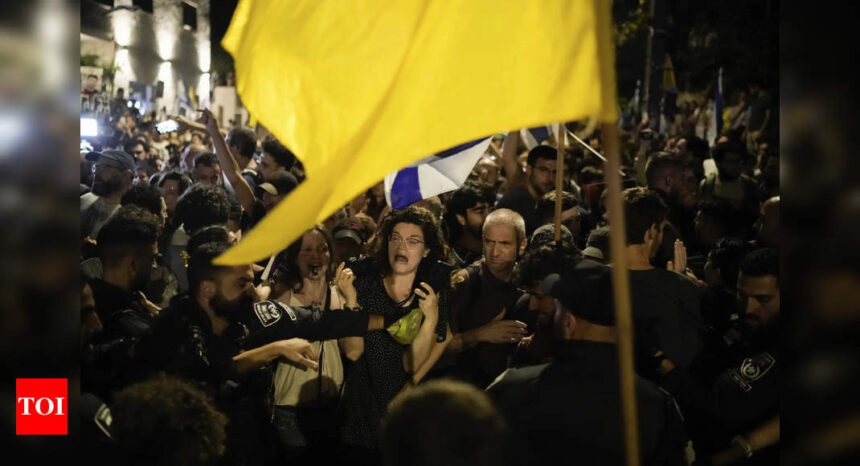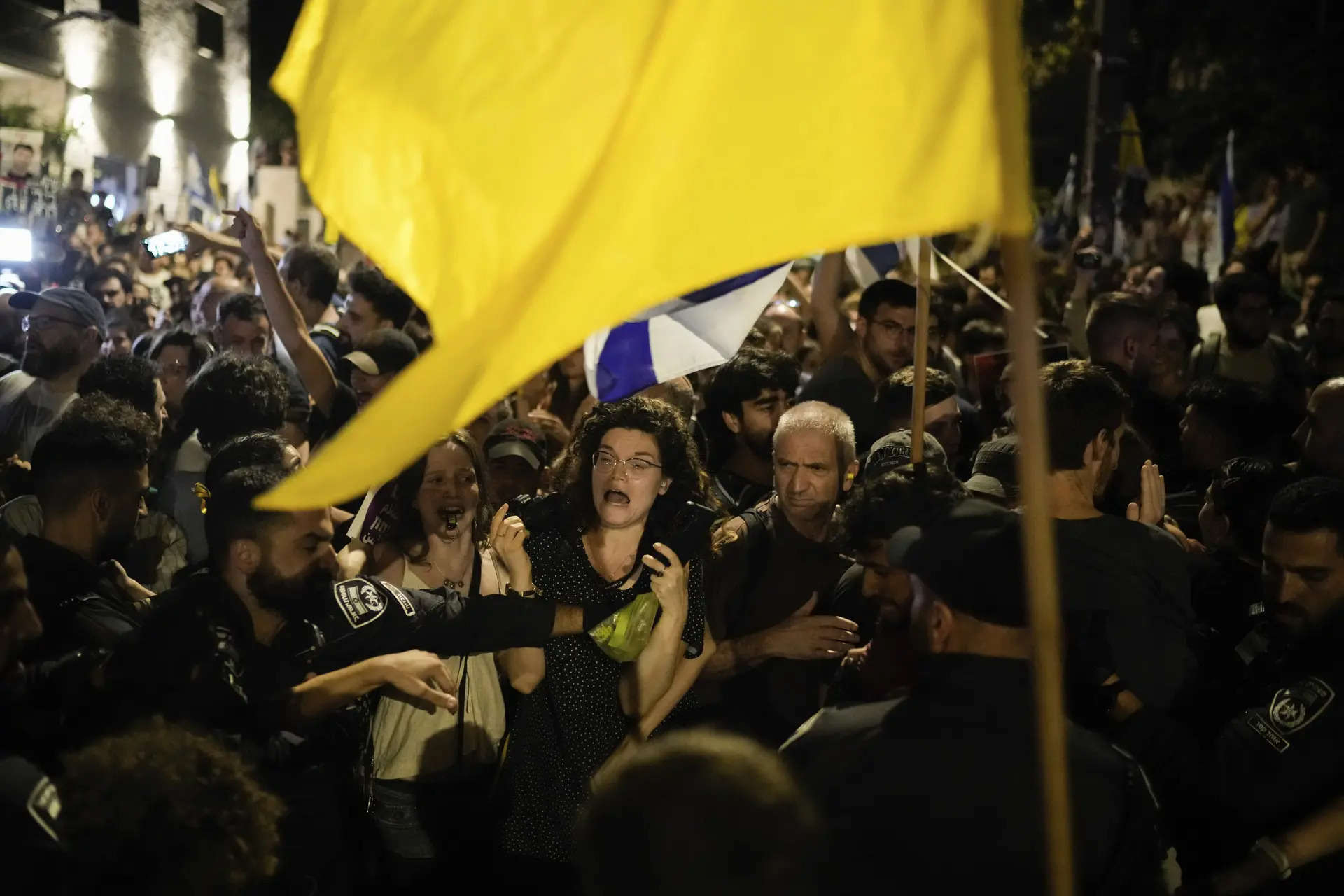After six Israeli hostages were found shot dead in a Gaza tunnel at the weekend, Prime Minister Benjamin Netanyahu did something he hadn’t done in 11 months of war — he apologized to the bereaved families.
“I want to tell you how sorry I am and ask for forgiveness for not being able to bring Sasha back alive,” he told the parents of Alexander Lobanov in the first of a series of such phone calls.
The gesture was among signs the discovery may prove to be a turning point in Israel’s long-running conflict with Hamas, after several months of inconclusive cease-fire negotiations. Hundreds of thousands of Israelis protested on Sunday to demand a truce with the Iran-backed group, while the main trade union called a strike that temporarily shut down banks, shopping malls and even the main airport on Monday morning.
“Netanyahu realized that a line had been crossed,” wrote commentator Yoav Limor in the Israel Hayom newspaper, a reference to the sense among many Israelis that the government didn’t do enough to save the hostages. “As of yesterday, Israel is not the same country.”
What that means for Netanyahu’s stance on the war remains to be seen. On Monday night, he gave a defiant press conference, saying Israel will not give up control of the border area between Gaza and Egypt, the so-called Philadelphi corridor, as Hamas has demanded.
Israel’s control of the area is key to “defeating Hamas, returning hostages and ensuring Gaza doesn’t pose a threat in the future,” he said. He added, “If we leave, we won’t go back,” citing “immense international pressure” that would be exerted on Israel.
Through that corridor, he said, Hamas has imported tons of arms that it has used against Israel. That pathway must be permanently controlled by Israel, he said.
Many argue US President Joe Biden’s administration should use the moment to press both Israel and Hamas to finally reach an agreement. The Washington Post reported on Monday that the US, alongside other international brokers Qatar and Egypt, is preparing a “take-it-or-leave-it” final deal.
“We’re very close” to tabling a proposal, Biden told reporters at the White House on Monday. Asked if Netanyahu is doing enough to secure the hostages, he answered simply “no.”
Israel has waged its campaign in Gaza ever since thousands of Hamas operatives swarmed into the south of the country on October 7, killing 1,200 people and abducting 250. In that time the government has pursued two often contradictory goals: destroy the group’s military and political infrastructure and bring the hostages back alive.
For the duration of the conflict — in which more than 40,000 Palestinians have been killed, according to health officials in Hamas-run Gaza — Israel assumed Hamas was protecting hostages to trade for concessions, such as the freeing of Palestinian prisoners. The discovery of the dead abductees casts doubt on that thesis.
“What we see in Hamas now, after 11 months of war, is a collapse of the command structure,” said Uzi Rabi, a senior researcher on Palestinian issues at Tel Aviv University. “This means that Israel’s policy of increased military pressure, which you could argue was working, may no longer serve the purpose. It’s a double-edged sword, and Netanyahu may have to shift policy.”
Hostages will “go back to their families in coffins” if Netanyahu keeps insisting on securing their release through military pressure, Abu Obaida, a spokesman for Hamas’s armed wing, said on his Telegram channel.
Israeli Defense Minister Yoav Gallant has been arguing that the country should accept a cease-fire proposal put forward by the US. First made public by Biden at the end of May, it calls for a three-stage process starting with the freeing of hostages in exchange for a withdrawal of Israeli troops.
Netanyahu’s own position has moved around. Most recently, he’s come down on the side of his right-wing coalition partners, Finance Minister Bezalel Smotrich and National Security Minister Itamar Ben Gvir, who say Israel mustn’t stop fighting Hamas even for a day until total victory is achieved. The release of hostages, they say, will follow.
Israeli public opinion, once on their side, has shifted. A monthly poll asking whether a hostage deal should be prioritized over destroying Hamas showed 72% in favor in July, up from 67% in June and 46% in May.
Israeli media reports on the cease-fire negotiations showed that some of those found dead were on the list of hostages due to be exchanged. That made their deaths more painful for families and friends, and a key element of Sunday’s protests was that Israel failed them.
“Our Hands Aren’t Clean of Their Blood,” ran a front-page headline in the centrist Yedioth Ahronoth newspaper on Monday.
Netanyahu’s right-wing coalition partners retain a degree of support, including among a small number of families of those still held in Gaza. They are members of a group called the Tikva Forum, which opposes compromise with Hamas and called on Israelis not to join demonstrations or strikes. Hamas is designated a terrorist organization by the US.
The mother of one of those found dead on Sunday said on the radio that “he would not be willing to have one terrorist released for him.”
Micah Goodman, a public intellectual of moderate political leanings, wrote in Israel Hayom that since the military has weakened Hamas, the strategic cost of a hostage deal is much lower than earlier in the conflict. It’s vital to find a way to reach an agreement, he said, to heal the nation.
“The two war objectives can be translated into two moral and Jewish aspirations: to take Hamas apart and to put Israel back together,” he said.
“I want to tell you how sorry I am and ask for forgiveness for not being able to bring Sasha back alive,” he told the parents of Alexander Lobanov in the first of a series of such phone calls.
The gesture was among signs the discovery may prove to be a turning point in Israel’s long-running conflict with Hamas, after several months of inconclusive cease-fire negotiations. Hundreds of thousands of Israelis protested on Sunday to demand a truce with the Iran-backed group, while the main trade union called a strike that temporarily shut down banks, shopping malls and even the main airport on Monday morning.
“Netanyahu realized that a line had been crossed,” wrote commentator Yoav Limor in the Israel Hayom newspaper, a reference to the sense among many Israelis that the government didn’t do enough to save the hostages. “As of yesterday, Israel is not the same country.”
What that means for Netanyahu’s stance on the war remains to be seen. On Monday night, he gave a defiant press conference, saying Israel will not give up control of the border area between Gaza and Egypt, the so-called Philadelphi corridor, as Hamas has demanded.
Israel’s control of the area is key to “defeating Hamas, returning hostages and ensuring Gaza doesn’t pose a threat in the future,” he said. He added, “If we leave, we won’t go back,” citing “immense international pressure” that would be exerted on Israel.
Through that corridor, he said, Hamas has imported tons of arms that it has used against Israel. That pathway must be permanently controlled by Israel, he said.
Many argue US President Joe Biden’s administration should use the moment to press both Israel and Hamas to finally reach an agreement. The Washington Post reported on Monday that the US, alongside other international brokers Qatar and Egypt, is preparing a “take-it-or-leave-it” final deal.
“We’re very close” to tabling a proposal, Biden told reporters at the White House on Monday. Asked if Netanyahu is doing enough to secure the hostages, he answered simply “no.”
Israel has waged its campaign in Gaza ever since thousands of Hamas operatives swarmed into the south of the country on October 7, killing 1,200 people and abducting 250. In that time the government has pursued two often contradictory goals: destroy the group’s military and political infrastructure and bring the hostages back alive.
For the duration of the conflict — in which more than 40,000 Palestinians have been killed, according to health officials in Hamas-run Gaza — Israel assumed Hamas was protecting hostages to trade for concessions, such as the freeing of Palestinian prisoners. The discovery of the dead abductees casts doubt on that thesis.
“What we see in Hamas now, after 11 months of war, is a collapse of the command structure,” said Uzi Rabi, a senior researcher on Palestinian issues at Tel Aviv University. “This means that Israel’s policy of increased military pressure, which you could argue was working, may no longer serve the purpose. It’s a double-edged sword, and Netanyahu may have to shift policy.”
Hostages will “go back to their families in coffins” if Netanyahu keeps insisting on securing their release through military pressure, Abu Obaida, a spokesman for Hamas’s armed wing, said on his Telegram channel.
Israeli Defense Minister Yoav Gallant has been arguing that the country should accept a cease-fire proposal put forward by the US. First made public by Biden at the end of May, it calls for a three-stage process starting with the freeing of hostages in exchange for a withdrawal of Israeli troops.
Netanyahu’s own position has moved around. Most recently, he’s come down on the side of his right-wing coalition partners, Finance Minister Bezalel Smotrich and National Security Minister Itamar Ben Gvir, who say Israel mustn’t stop fighting Hamas even for a day until total victory is achieved. The release of hostages, they say, will follow.
Israeli public opinion, once on their side, has shifted. A monthly poll asking whether a hostage deal should be prioritized over destroying Hamas showed 72% in favor in July, up from 67% in June and 46% in May.
Israeli media reports on the cease-fire negotiations showed that some of those found dead were on the list of hostages due to be exchanged. That made their deaths more painful for families and friends, and a key element of Sunday’s protests was that Israel failed them.
“Our Hands Aren’t Clean of Their Blood,” ran a front-page headline in the centrist Yedioth Ahronoth newspaper on Monday.
Netanyahu’s right-wing coalition partners retain a degree of support, including among a small number of families of those still held in Gaza. They are members of a group called the Tikva Forum, which opposes compromise with Hamas and called on Israelis not to join demonstrations or strikes. Hamas is designated a terrorist organization by the US.
The mother of one of those found dead on Sunday said on the radio that “he would not be willing to have one terrorist released for him.”
Micah Goodman, a public intellectual of moderate political leanings, wrote in Israel Hayom that since the military has weakened Hamas, the strategic cost of a hostage deal is much lower than earlier in the conflict. It’s vital to find a way to reach an agreement, he said, to heal the nation.
“The two war objectives can be translated into two moral and Jewish aspirations: to take Hamas apart and to put Israel back together,” he said.
Source : Times of India









